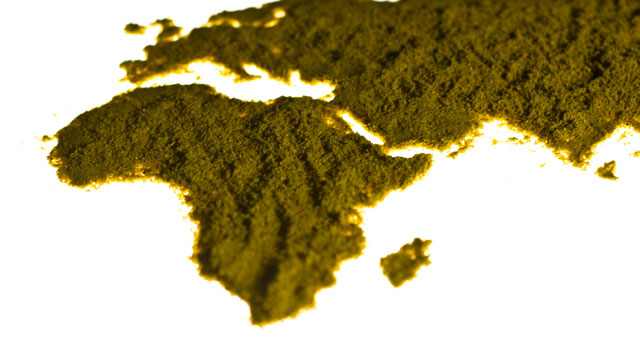
As a fourth-generation clan chief of a village in rural Cameroon, Gaston Donnat Bappa’s daily life is steeped in tradition.The 200 residents of the village have little if any access to electric power, phones, TV or radio — but the IT engineer, consultant and specialist has been immersed in the world of technology for the past three decades.
Now Bappa, who insists tradition and modernity can be “collaborators”, is spearheading a project to create Africa’s answer to Wikipedia, in a bid to preserve the continent’s customs and beliefs.
“I have tradition deep within me and I want it to be seen everywhere,” said the chief, wearing traditional robes and sitting behind a PC, after officially launching the African Traditions Online Encyclopedia (Atoe) at last week’s eLearning Africa conference in Uganda.
“With seven million years of tradition in Africa, what is 500 years of colonisation and slavery? Nothing,” he said.
But he warned that the continent’s heritage was quickly vanishing.
“We have a multitude of more than two thousand languages in Africa,” said Bappa. “[But] a language dies every two weeks in the world and faster in Africa, because there are more here than anywhere else.
“We have to come back to our traditions. We have to come back to this basis, the foundations and roots that we have so that we build a good future. To go forward, you must first know where you are coming from.
“We are going to put the traditions of Africa online. Every single tradition from each country will be put online.”
Bappa, 56, who is six months into building the user-generated website, which will amass the collected knowledge, culture and history of Africa using the same software used to build the Wikipedia pages, conceded it would be a mammoth task “that will never finish”, given the sweeping definition of “tradition”.
“Everything is tradition — anything, anything in life. There are no limits,” he said. “Maths, science, religion, medicine, arts, craft, when it’s in the past, [it] becomes tradition. Everything in human life becomes tradition when it’s in the past.
“We have more than 100 000 religions here in Africa,” said Bappa. “We have more than 100 000 tribes and each has their own specific tradition, crafts and culture.”
Launched in 2001 by entrepreneur Jimmy Wales and software developer Larry Sanger, the English-language version of Wikipedia currently contains more than 4m articles and has been described as “an unplanned miracle”.
Wikipedia link-up
Bappa, who is from Cameroon’s Bassa tribe, one of the country’s 250 clans, said Atoe could include information from the existing Wikipedia site.
He hasn’t spoken to Wikipedia yet, but is confident they’ll be “delighted” to hear about his plans.
“We are going to ask Wikipedia if they can transfer all the information on African traditions to our database, and they’ll be very happy to do so,” he said.
But “anyone, anywhere” will be welcome to contribute to Atoe, which he hopes will be accessible to “every human, to every African, no matter where they are. People in the diaspora are also greatly in need of tradition,” Bappa said.
His village, Ndjock-Nkong, is located about 150km from the capital Yaoundé, in the Babimbi region of Cameroon. A traditional chief for the past 22 years who heads an association of 42 chiefs, Bappa’s role involves local administration, clan leadership and cultural mediation. He splits his time between Ndjock-Nkong and Yaoundé.
Most people in Bappa’s village do not have access to electricity, although the public administration has begun to install it and some residents use generators. A rural radio project has been established but Internet access is not yet available.
The chief, who has a degree in information engineering and a diploma in banking and finance, says the infrastructure and technology in the area needs to be strengthened so that this can be used to create dialogue and preserve tradition.
“We must open up rural areas by creating roads, by strengthening radio, phone lines, TV so the people can converse and communicate with the others outside,” Bappa said.
A team of seven is working on Atoe, he said, and its headquarters will be in a rural area, but a satellite would guarantee Internet access.
Global village
The cultural leader has found an unlikely ally in Valerie Wood-Gaiger, a Welsh woman who formed the charity Learn with Grandma to encourage intergenerational learning.
Wood-Gaiger, who will turn 73 next month, has been working in Uganda with an agency that provides training for teachers on how to use information and communication technologies in schools.
She will be “encouraging people to record their elders talking about history, culture and languages and showing how to do the skills that we still need” for Atoe, said Bappa.
Wood-Gaiger, who lives in a village in the Brecon Beacons National Park in Wales, said: “We live in the same global village. I am only a click away.”
Atoe will be unveiled at the 10th anniversary of eLearning Africa in 2015. Organisers said they would announce the location of next year’s event within days.
Last week’s conference in Kampala, co-hosted by Uganda’s ministry of information and communications technology, drew more than 1 500 participants and 300 speakers, making it the continent’s biggest gathering of e-learning professionals to date.
- Visit the Mail & Guardian Online, the smart news source

